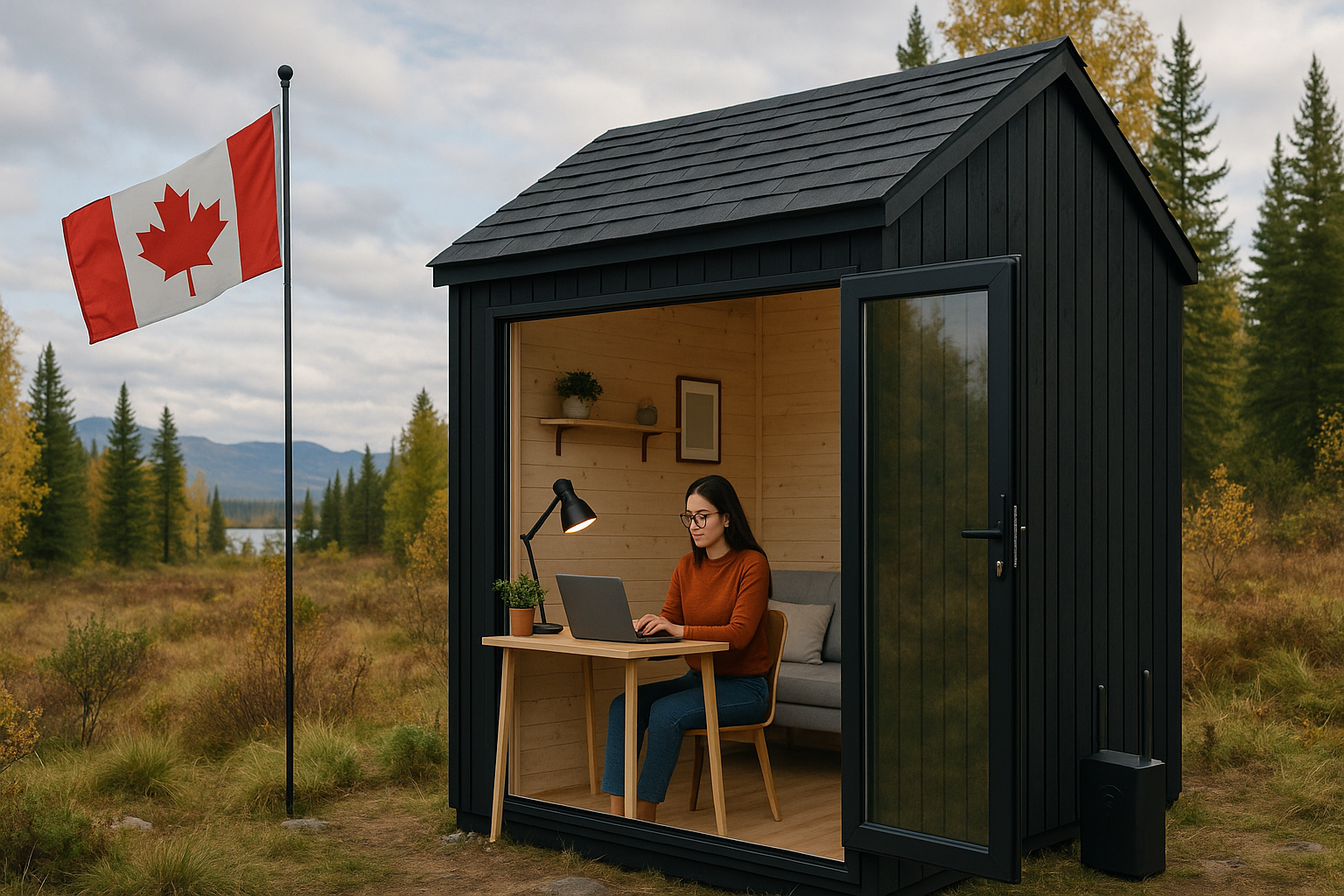
Estimated reading time: 8 minutes
Digital Nomads in Canada: Maximizing Your Remote Work Experience with Tiny Home Offices and ADU Internet
Key Takeaways
- Invest in smart workspace design: Use ergonomic, space-saving solutions for your tiny home office. For inspiration, check out tiny home design in Canada.
- Secure reliable ADU internet: Ensure high-speed connectivity with backup options for uninterrupted remote work.
- Maintain work-life boundaries: Create distinct zones and routines to balance productivity with personal well-being.
- Embrace community support: Connect with communities like Big Calm or Nomad Coliving to combat isolation and enhance your nomad lifestyle.
Table of contents
Digital nomads—people who use technology to work remotely—are redefining how and where Canadians work. Whether sending emails from the Rockies, attending virtual meetings in Vancouver, or finishing projects while overlooking a serene Quebec forest, the freedom to choose your location is truly liberating.
The shift to remote work, fueled largely by recent global events, has sparked a surge in this mobile lifestyle. As traditional offices give way to innovative setups, tiny home offices and Accessory Dwelling Units (ADUs) are emerging as efficient, flexible workspaces across Canada. These compact environments provide minimalism, cost savings, and adaptability—ideal for a dynamic, digital nomad lifestyle. For further reading on remote work in Canada, check out this resource.
Understanding the Nomad Lifestyle: Digital Nomads & Nomad Lifestyle
Being a digital nomad isn’t merely about working from unique locations—it’s adopting a mindset centered around independence, adaptability, and creative problem-solving.
What is the Nomad Lifestyle?
- Embrace freedom by choosing when and where to work.
- Seamlessly blend living and work, even outside conventional offices.
- Value self-management, autonomy, and creative adaptability.
Benefits Digital Nomads Enjoy:
- Location independence: Choose to live in vibrant cities, quaint small towns, lakeside retreats, or off-grid sanctuaries.
- Flexible schedules: Work during your peak energy hours and enjoy leisure during downtime.
- Personalized workspaces: Tailor your tiny home environment to maximize comfort and productivity.
Over half of digital nomads worldwide cite flexibility and location independence as key motivators, as highlighted by this study.
The Unique Challenges of Remote Work:
- Unreliable internet: Frequent connectivity issues can disrupt workflow.
- Isolation: Working remotely may lead to feelings of loneliness, emphasizing the need for community.
- Space limitations: In tiny homes, every inch matters for both work and rest.
Tiny Home Offices and ADUs: The Smart Solution
- Compact, efficient living: Enjoy minimalist spaces that reduce waste and foster creativity.
- Cost savings: Lower expenses free up resources for travel and experiences.
- Environmental benefits: Smaller living spaces contribute to a reduced ecological footprint.
- Adaptability: Easily transition as new remote work opportunities emerge.
Communities such as Big Calm in British Columbia offer specialized communal workspaces, fast ADU internet, and a connection to nature. This trend reflects the growing demand among Canadian digital professionals. For more on minimalist living benefits, visit this guide.
Designing an Efficient Tiny Home Office for Remote Work
A well-designed tiny home office can transform productivity and elevate your overall sense of well-being. Each inch of space matters, and thoughtful design can turn any nook into a hub of creativity.
Why Design Matters: A tailored workspace supports creativity and thorough focus. For insights on maximizing small spaces, refer to this compact living guide and this resource on small homes.
Actionable Design Tips for Small Spaces:
- Fold-down desks: Utilize wall-mounted, folding desks to save space.
- Wall-mounted shelves: Maximize vertical storage to keep the floor area clear.
- Compact task lighting: Use clip-on lamps or LED strips to brighten your workspace without clutter.
-
Multipurpose furniture:
- Storage ottomans that double as seating and storage.
- Murphy beds that fold neatly against the wall.
- Convertible tables that shift from coffee table to work surface.
- Declutter relentlessly: Keep only essential items using labeled bins, vertical storage, and under-desk drawers. For decluttering strategies, see this guide.
Ergonomics in a Tiny Home Office: Invest in a supportive, adjustable chair; use an adjustable desk; and maintain proper posture by arranging your monitor and keyboard at the right heights.
Optimize for Light and Air: Place your desk near a window for natural light and ensure good ventilation with open windows, fans, or a compact air purifier. More ideas on enhancing productivity can be found at this resource.
Ensuring Reliable ADU Internet Connectivity in Canada
For digital nomads, ADU internet is more than a convenience—it’s a necessity. Whether it’s video conferencing or cloud computing, high-speed internet in a tiny home or ADU is critical.
Canada’s Main Internet Solutions:
- Fiber-optic connections: Ideal for urban areas with gigabit speeds.
- 5G wireless networks: Expanding rapidly in urban and some suburban regions.
- Satellite internet: A reliable option in remote or rural settings.
Tips to Maximize Connectivity:
- Install mesh Wi-Fi systems to distribute wireless signals evenly throughout your ADU or tiny home.
- Use Wi-Fi range extenders to cover larger plots or separate units.
- Set up a wired Ethernet connection for a stable link during critical tasks.
- Create a dedicated area for your modem and router to reduce troubleshooting downtime.
- Keep a backup connectivity option, such as a mobile hotspot, for extra security.
Research underscores the importance of stable connectivity for remote work, as noted by this source and this one. For technical insights on ADU infrastructure, visit this link.
Enhancing Work-Life Balance While Living and Working in Tiny Homes or ADUs
Establishing a clear boundary between work and leisure is crucial. Without it, digital nomads may find work spilling into personal time, affecting overall well-being.
Strategies for a Healthy Work-Life Balance:
-
Define separate “work” and “life” zones:
- Use movable screens or bookshelves as visual barriers.
- Dedicate a specific corner to your desk and clear it after work hours.
- Stick to a set work schedule: Establish rituals like a morning coffee or walk to signal the start and end of your workday.
- Use calming décor: Incorporate soft lighting, cozy rugs, or small houseplants to encourage relaxation when off duty.
-
Leverage natural surroundings and community amenities:
- Take lunch breaks outdoors when possible.
- Join co-living or digital nomad groups like Nomad Coliving to access shared workspaces and social events.
- For community-focused living ideas, visit this resource.
- Prioritize self-care: Schedule exercise, hobbies, and personal time, and manage notifications to prevent burnout.
By establishing clear boundaries and engaging with like-minded communities, digital nomads can enjoy a harmonious balance between work and personal life.
Conclusion: Digital Nomads, Tiny Home Office & ADU Internet
Tiny home offices and ADUs offer a practical path to flexibility, mobility, and sustainability for Canadian digital nomads. Thoughtfully designed spaces paired with reliable internet connectivity deliver:
- Efficient, personalized work environments that boost productivity.
- Flexible solutions that allow relocation without disrupting your career.
- Significant cost savings and a reduced ecological impact.
Ready to elevate your remote work setup? Explore tailored tiny home office layouts and ADU internet solutions that align with your digital nomad lifestyle. For further details on digital nomad-friendly communities and workspace designs, check out additional research from this source, this one, and this resource.
Frequently Asked Questions
Q1: What is a digital nomad?
A: A digital nomad is someone who leverages technology to work remotely, allowing them to travel and live in flexible environments.
Q2: How do tiny home offices improve productivity?
A: Tiny home offices are designed for efficiency and minimal distraction, enabling focused work in a compact space with smart, space-saving solutions.
Q3: Why is reliable ADU internet so important?
A: Consistent, high-speed internet is essential for video conferencing, file sharing, and maintaining communication, especially for remote workers in compact spaces.

Leave a Reply